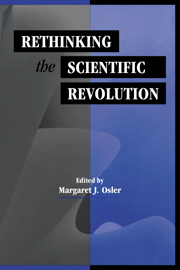Book contents
- Frontmatter
- Contents
- List of Contributors
- Preface
- Introduction
- Part I The Canon in Question
- Part II Canonical Disciplines Re-Formed
- 4 The Role of Religion in the Lutheran Response to Copernicus
- 5 Catholic Natural Philosophy: Alchemy and the Revivification of Sir Kenelm Digby
- 6 Vital Spirits: Redemption, Artisanship, and the New Philosophy in Early Modern Europe
- 7 “The Terriblest Eclipse That Hath Been Seen in Our Days”: Black Monday and the Debate on Astrology during the Interregnum
- 8 Arguing about Nothing: Henry More and Robert Boyle on the Theological Implications of the Void
- Part III Canonical Figures Reconsidered
- Part IV The Canon Constructed
- Index
7 - “The Terriblest Eclipse That Hath Been Seen in Our Days”: Black Monday and the Debate on Astrology during the Interregnum
Published online by Cambridge University Press: 25 October 2009
- Frontmatter
- Contents
- List of Contributors
- Preface
- Introduction
- Part I The Canon in Question
- Part II Canonical Disciplines Re-Formed
- 4 The Role of Religion in the Lutheran Response to Copernicus
- 5 Catholic Natural Philosophy: Alchemy and the Revivification of Sir Kenelm Digby
- 6 Vital Spirits: Redemption, Artisanship, and the New Philosophy in Early Modern Europe
- 7 “The Terriblest Eclipse That Hath Been Seen in Our Days”: Black Monday and the Debate on Astrology during the Interregnum
- 8 Arguing about Nothing: Henry More and Robert Boyle on the Theological Implications of the Void
- Part III Canonical Figures Reconsidered
- Part IV The Canon Constructed
- Index
Summary
One result of the dominance of the concept of the “Scientific Revolution” over the study of early modern thought about nature has been that different cultural practices concerning the natural world have been conceived as either on the side of the revolution or against it. Recovery of occult or “unscientific” belief such as astrology or alchemy has either claimed that these activities contributed to the advance of science, as Richard Westfall describes alchemy as part of the Scientific Revolution, or ascribed a positive value to the occult and a negative one to the Scientific Revolution itself. However, to rethink the Scientific Revolution requires the examination of the uses of nature in the early modern period without presupposing either the “scientific” nature of these practices or the “revolutionary” nature of their changes and conflicts. This essay is an attempt to read the English reception of a particular incident – the “Black Monday” solar eclipse of March 29, 1652 – not as an episode in the Scientific Revolution (although such a reading is possible), but as the clash of a variety of positions on natural phenomena and their meaning for humanity.
The English Interregnum, the period between the execution of King Charles I in 1649 and the Restoration of his son Charles II in 1660, saw a passionate debate on both the popular and learned levels on the validity of judicial astrology. The two most influential discussions of the decline of judicial astrology in early modern England have been those of Keith Thomas, in Religion and the Decline of Magic (1971), and Patrick Curry, in Prophecy and Power: Astrology in Early Modern England (1989).
- Type
- Chapter
- Information
- Rethinking the Scientific Revolution , pp. 137 - 152Publisher: Cambridge University PressPrint publication year: 2000



